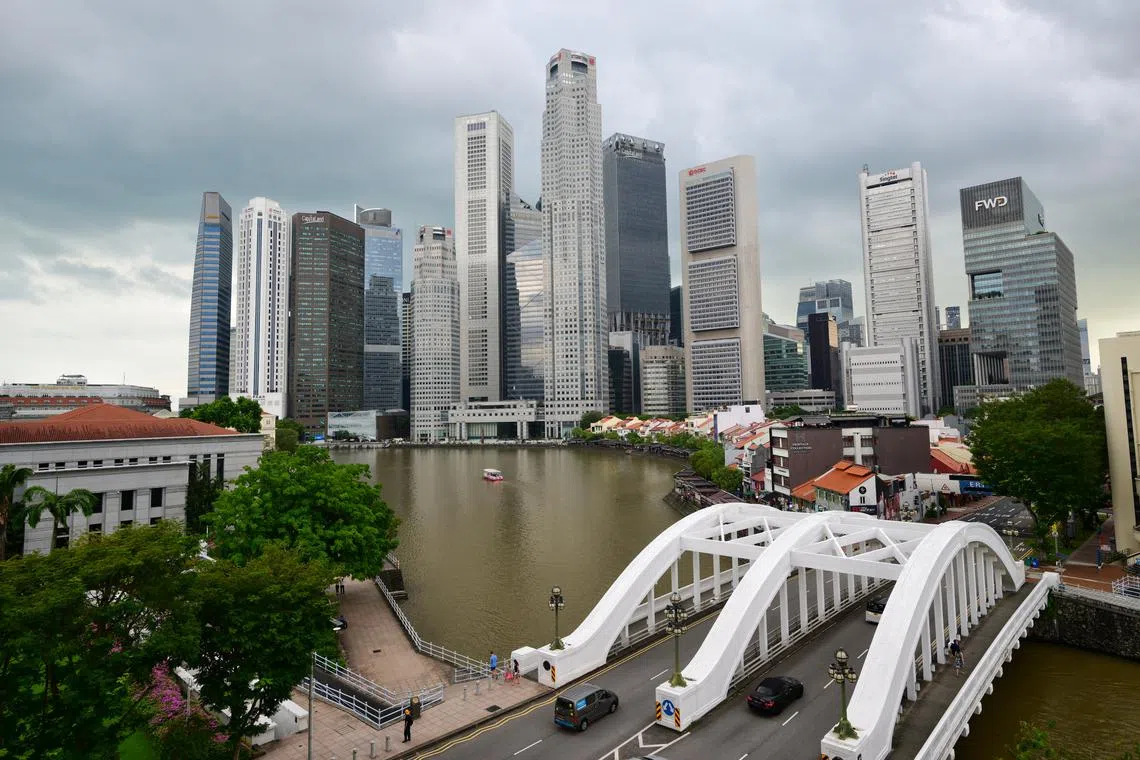6 in 10 Singapore firms worry skills gaps will hinder transformation: Report
Sign up now: Get ST's newsletters delivered to your inbox

Around 64 per cent of Singapore employers expect their business to be impacted by geoeconomic fragmentation, according to a WEF report.
ST PHOTO: AZMI ATHNI
Follow topic:
SINGAPORE – More major employers have signalled that fragmenting global economic links are especially likely to shake up their business in Singapore than the rest of the world.
Around 64 per cent of Singapore employers expect their business to be impacted by geo-economic fragmentation, twice the global average recorded across 55 economies, according to a World Economic Forum (WEF) report on the future of jobs. The figure is second to only South Korea’s 71 per cent.
The Jan 8 report drew from a survey of over 1,000 international employers across 55 economies, conducted from May to September 2024. But it does not indicate how many of these employers have a Singapore base.
The WEF’s results indicate weaker global trade links, together with rapid technological advancement in the Republic’s developed economy, are likely to change the type of jobs on offer and increase the skills threshold needed to qualify for these roles.
“Similar to global and regional peers, firms in Singapore expect skills gaps, regulatory barriers and organisational resistance to hinder business transformation,” said the WEF.
Six in 10 of firms polled here said they expect skills gaps in the labour market to hinder transformation, the barrier most commonly reported by employers here, though this is marginally lower than the global average of 63 per cent.
In a reflection of how fast skill needs here are evolving, 70 per cent of the workforce here are projected to require upskilling or reskilling by 2030, compared to 59 per cent globally. Despite this, the gap could yet widen, with 14 per cent here unlikely to receive the skills boost they need, compared with 11 per cent overall.
Moreover, the WEF found an elevated structural labour market churn of 28 per cent is expected over the next five years in Singapore, versus 22 per cent globally.
The measure is meant to quantify the amount of disruption a labour market is likely to face, using projections of job creation and displacement, separate from job changes arising from personal choice.
Meanwhile, 38 per cent of Singapore firms found an “outdated or inflexible regulatory framework” to hinder business transformation, close to the global average of 39 per cent.
The WEF said 97 per cent of companies here plan to prioritise upskilling as their key workforce strategy, significantly above global levels of 85 per cent.
“Hiring staff with emerging skills and process automation are also among anticipated key workforce strategies,” the report said about Singapore companies.
This comes against a backdrop of Singapore companies increasing the adoption of automation ahead of the global curve. Already, 97 per cent of organisations here that the WEF surveyed are running artificial intelligence (AI) software on some level, outstripping the 88 per cent global average.
Currently, 56 per cent of tasks are said to be completed here either predominantly by technology or a mix of people and technology, above the global average of 52 per cent. The figure is projected to increase to 70 per cent in Singapore by 2030, the WEF said.
Even though a skills-first approach is perceived as having the potential to expand Singapore’s talent pool, the WEF said, 58 per cent of employers here expect to continue prioritising university degrees in hiring decisions, above the 43 per cent global average.
Overall, front-line roles, including farm workers, delivery drivers and construction workers, are poised to see the largest job growth in absolute terms by 2030, the WEF said.
“Significant increases are also projected for care jobs, such as nursing professionals, and education roles, such as secondary school teachers, with demographic trends driving growth in demand across essential sectors.”
Increased demand for AI, robotics and energy systems specialists due to advances in these fields is also expected.
The WEF noted that creative roles impacted by the rise of generative AI, including graphic designers, are on the list of jobs with the most rapid projected decline. Cashiers and administrative workers are on the list too.
Mr Brian Lee, economist at Maybank Securities Singapore, said geo-economic fragmentation impacts trade-reliant economies such as Singapore disproportionately, due to their dependence on external markets and international supply chains.
“Outward-oriented sectors like manufacturing, wholesale trade, transport and logistics could be more vulnerable to this trend,” he said. “Nonetheless, Singapore and the rest of Asean have benefited from rising US-China tensions and trade decoupling in the form of increased foreign direct investment, as global manufacturers seek to diversify their supply chains.”
He added that Singapore should maintain and deepen cooperation with advanced economies across the board, while also expanding its connectivity to regional economies, and pursuing deeper Asean integration to stay resilient in the face of fragmentation.
Mr Rahul Chawla, partner and head of talent solutions for South-East Asia at professional services firm Aon, said the high quality, affordability and accessibility of university education here contribute to the allure of using degree credentials to drive hiring decisions.
“Singaporean universities are consistently recognised for their interdisciplinary education that attracts a global pool of talent,” he said, adding that this is why companies see these university credentials as a filter and criterion for hiring.
Moreover, a skills-first hiring approach is conceptually sound but difficult to implement and execute, added Mr Chawla.
“Aside from very specific skill sets, like coding, assessments typically end up taking the form of technical interviews, which are time-consuming to conduct,” he said, adding that employers might not be able to evaluate candidates’ skill levels for very specialised roles.
Tay Hong Yi is a correspondent who covers manpower and career issues, with occasional forays into fintech, trade and corporates.


